Cross-Disciplinary Lesson Planning Transcript
Jennifer Wolfe: This is my friend and English partner, Erin Gilrein. She's been teaching English here at Oceanside High School for twelve years.
Erin Gilrein: This is my friend and colleague, Jennifer Wolfe. Together, we collaborate on the Ninth Grade Integrated Program here at Oceanside High School. Our school very much respects the integrated nature of the program and in our prep periods, there is a period designed where Jenn and I are off together so we have collaboration time built into our schedule.
Jennifer Wolfe: We have our collaboration time every other day. Okay, what are we doing this week?
Erin Gilrein: The kids just finished writing this essay on Siddhartha - it's an explanatory essay on Siddhartha - and I want to do that warm and cool feedback thing that we do in English and I know you do in Global as well.
Jennifer Wolfe: We have a program where all of the Ninth grade students are teamed. English and Social Studies teachers share the same 80 kids - 100 kid. Those kids are taught one period by the Social Studies teacher while the other half of those kids are taught by the English teacher and then once they switch periods, the kids who are in her English class are now in my Social Studies class and the kids who are in my Social Studies class are now in her English class and then that third period we meet with half of the kids together.
[00:01:27.11]
Erin Gilrein: I brought out our plan for the warm and cool feedback and this is the copy that we use in English - you'll see in the beginning that the goals are related to the six traits rubric that we use but - in global you have your AP rubric for - right, so perhaps - I'm gonna adjust - I'm gonna, obviously, change the title but I'm definitely gonna include the AP rubric pieces.
Jennifer Wolfe: In my class, I'm using a document-based question on the religions and how religion effects individual behavior. If we're gonna use the Common Core standards and the AP standards, they should dovetail nicely.
Erin Gilrein: Jenn and I collaborate on a host of different things as partners. One way we collaborate is we look at the different kinds of writing we want our kids to do in our subject areas and we find a way to unite the writings so that they're addressing the skills that I need to address and the skills that Jenn needs to address.
[00:02:19.07]
Erin Gilrein: When we get the kids to look to see what their thesis is, they don't always have a thesis. So, perhaps there's a way we can adjust that question so that we have a conversation happening with the kids who don't have thesis statements.
Jennifer Wolfe: Right. We could do something like, if there's no thesis, ask, "what did your essay want to prove? What did you want to prove?"
Erin Gilrein: Nice. We definitely should add that in. I have a Power Point that I use in class with the kids for this I'll send to you so then we definitely have exactly the same thing happening in the front of the room so the kids know that we're on the same page as usual.
Jennifer Wolfe: We want them doing the same things in both essays, they don't always realize that it's the same thing because we don't use the same words.
Erin Gilrein: Exactly. But good writing is good writing.
Jennifer Wolfe: A lot of the AP standards in terms of contextualizing, of finding voice of using text in your answer, all of those requirements in AP are a lot of the Common Core standards. Which one of the Common Core standards are you doing? The site-specific evidence, I see that right away.
[00:03:18.20]
Erin Gilrein: Definitely setting specific evidence and identifying and gathering relevant information. And defining common organizational structures and of course, working to develop the organizational structures.
Jennifer Wolfe: I'll make sure to put into my sheet the same exact ones.
Erin Gilrein: In terms of the Common Core, we have found that we are focusing a lot on the shifts about bridging informational and literature texts so that we have a balance in both.
Jennifer Wolfe: What was great, though, is that when Erin brought to me the shifts initially and showed me the different standards, I realized that, in my own class, I hadn't been talking about academic vocabulary as much as I should. I hadn't been integrating enough of the literature, really, in my class. That brought a whole new dimension to my teaching because she was such an expert, really, on the Common Core.
[00:04:14.21]
Jennifer Wolfe: If we're going to use the Common Core standards and the AP standards, it should dovetail nicely, actually.
Erin Gilrein: In fact, when I was looking at my Common Core guide over here, it definitely delineated everything we needed to know where the kids need to develop the topic and choose appropriate examples, root it in the text and all of that is indicated on here when they give feedback to each other.
Jennifer Wolfe: Now, which ones are you highlighting? We spend a lot of time talking about the curricula. What am I teaching next?} What are you teaching next? How can we meet in the middle? Where are the common themes that we can use to teach the kids? Well, what are some of the themes that you do?
Erin Gilrein: Wealth versus poverty, trying to find ways to grow, to become part of a different social class. Does that even work for this unit in global? There's always the personal exploration part of it.
Jennifer Wolfe: That might work. We talk about what kind of teaching that respond to, what types of lessons we wanna create. So, we spend a lot of time talking about the kids, about the curricula and also about skills.
[00:05:22.02]
Erin Gilrein: You know what I saw that would be kind of cool? Not necessarily for this - they had this - and students were assigned each other so that by the end of class they handed in a rubric filled out for the person they were designed to listen to which would be pretty cool.
Jennifer Wolfe: But they would be listening to that person in the conference period then on Wednesday or you mean during the discussion?
Erin Gilrein: During the discussion.
Jennifer Wolfe: I worry about that because - then they're only gonna be listening for their person.
Erin Gilrein: Yeah. And maybe missing the bigger picture.
Jennifer Wolfe: They're not - this isn't as natural for them as it will be in June and I think they'll be so focused on whatever their person is saying that they may not listen to the group. So maybe we'll save that for the next time we do it cause I think that's a really worthwhile thing but let's try getting them to think about what they said themselves during the conversation and then we can debrief and somebody will probably say, "hey but you also said this," I'm guessing - cause you know how they like to tell each other what to do.
[00:06:15.12]
Jennifer Wolfe: It's been really eye-opening for me because I was one of those teachers before we started working together - that didn't really like integrating with other teachers because I didn't like giving up any of my content and Erin has taught me to be more open, to be more accepting of what's happening, to use books and literature in my Social Studies class - when I wasn't using them before. It's a really nice partnership. Her strengths are my weaknesses and my strengths - some of them - are her weaknesses. So it's nice.
END
[00:07:09.12]

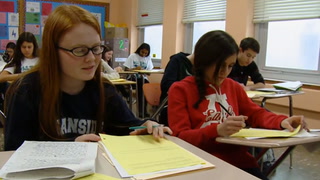
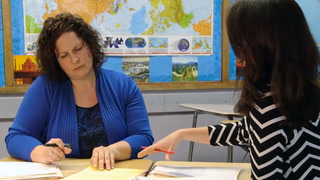
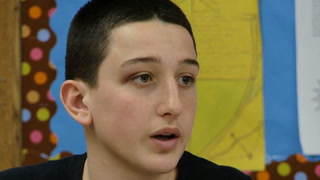
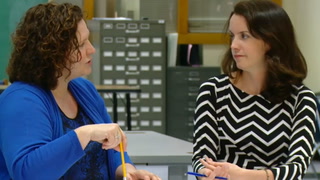
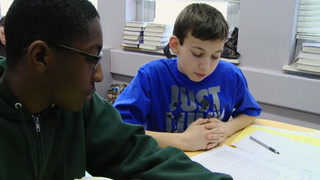








8 Comments
Mya Neric Apr 27, 2018 2:51am
Marilyn Jules Jan 30, 2018 4:51pm
Skylar Dolezel Feb 21, 2017 10:03pm
Brian Rodriguez Jun 20, 2016 12:34pm
Adam Hopson Jun 2, 2015 12:49pm